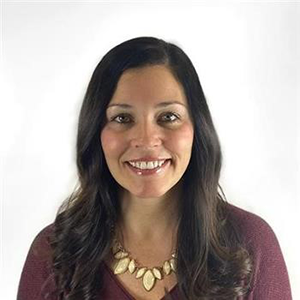- Home
- Student Life
- Griffin Success Stories
- Bria Hoey, EdD
Bria Hoey, EdD
Education (Graduate)

Bria Hoey is currently pursuing her doctoral degree from GMercyU. Prior to attending GMercyU, Bria obtained her bachelor’s degree in Special Education (K-12) from West Chester University and her master’s degree in Educational Leadership (M.Ed.) from Cabrini University. She also completed the Applied Behavior Analysis Program and Certification at Arcadia University.
Coming to GMercyU
Bria first heard about GMercyU through a colleague who was finishing her degree in GMercyU’s Doctorate of Education program.
“She spoke very highly of the support she received through her course work and dissertation. Those were both important factors for me when I was looking at programs,” Bria said. “The selling point for me was that it was a cohort model, so although completed mostly asynchronous, I feel like I have learned a lot about my classmates, and the first dissertation course is the second course you take in the program. I didn’t want a program that made you wait until after your courses to start writing.”
Pursuing Higher Education
As part of her role as a Professional Development Specialist at the Delaware County Intermediate Unit, Bria must have knowledge of current research and have the ability to expand her learning to bring information to the county.
“I knew the challenge of getting my EdD would not only benefit my own knowledge but the teams, administrators, and staff that I train and coach each day. It has always been a goal of mine to teach in the Higher Education setting, and by continuing my education, I knew this adventure would support my goal,” Bria said.
Experience in EdD
“I have had an amazing experience in the program and have grown a lot as an educator. I have felt supported by my classmates and instructors, which has contributed to my success,” Bria said.
When she first started, Bria thought the length of the program would take forever, but she currently has only six months left and can’t believe how time has flown by.
“Dr. Tamarah Smith is the key reason this program is so successful. Her ability to take large, complex concepts or tasks and breaks them into manageable parts is something we all appreciated in the Quantitative Research class. Her positivity and support are something that everyone in the program cherishes. I couldn’t have survived the dissertation process and IRB without her,” Bria said. “At times when I doubted myself and my goal for research, she reassured me that I was on the right track and that it would be impactful. She has given me opportunities to share my knowledge with others and I couldn’t be more grateful to have her as part of my journey.”
Dissertation Process
The topic Bria chose for her dissertation is Understanding a Sense of Belonging for Students on the Autism Spectrum.
Bria found it difficult to narrow down a topic because she is interested in many education topics and she wanted to focus on something that matters or would be meaningful for students on the Autism Spectrum. Her interest in Autism came from her experience as a classroom teacher, where she taught middle school Autistic Support.
“Seeing the daily challenges my students faced with fitting in, being accepted, and feeling as they belonged was something I wanted to learn more about and how to best support that population. By directly interviewing middle school students on the Autism spectrum about their experiences, I was able to generate a list of factors that they felt inhibited belonging as well as promoted it in their inclusive middle schools. By sharing this new research with school staff and neuro-typical peers, a voice that is not typically shared will be heard, and ultimately create a community where everyone belongs,” Bria said.
Why Education?
Bria always knew she wanted to be a special education teacher. At about fourteen years old, Bria began to babysit a neighbor who was on the Autism Spectrum.
“I was always curious how I could help him, and what I could learn from him,” Bria shared.
Growing up, Bria didn’t have much exposure to students with significant disabilities, and she knew she found her future career when she couldn’t find enough information about Autism.
“I was constantly researching, reading books, articles, watching videos, and continuing to work with my neighbor. I went into undergrad with an agenda to be an Autistic support teacher and learn as much as I could through past research. Now, almost 20 years later, I am leaving my doctoral program contributing research to the field,” Bria said.
Advice for Future Educators
“Do it for the right reasons. Teaching is hard, very hard. There are many factors that come into play besides just ‘teaching’ that make education a challenging place to be right now. If you get into the field for the right reasons, you will find so much joy in what you do that those factors will not matter,” Bria said. “Always be curious and wanting more – more knowledge, more experience, more education. The educators that are life-long learners are the ones that find teaching rewarding, even on the tough days.”